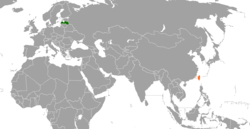Latvia–Taiwan relations
 | |
Latvia |
Taiwan |
|---|---|
| Diplomatic mission | |
| None | Taipei Mission in the Republic of Latvia |
| Envoy | |
| None | Representative Andrew H.C. Lee |
Latvia–Taiwan relations, also retroactively known as ROC–Latvian relations date back to August 16, 1923, when the Republic of China recognized Latvia de jure, in that period when the island of Taiwan was under Japanese colonial rule. After the Soviet occupation of Latvia in 1940, the ROC is one of the few countries that did not recognize Latvia's incorporation into the Soviet Union.[1][2][3][4]
After restoring its independence in 1991, Latvia pursued an ambiguous policy towards the issue of China, at one point in 1991 and 1992 briefly having established relations with both the ROC and the People's Republic of China, until the PRC froze ties with Latvia in 1992.[5] This policy was allegedly due to Latvian desires of receiving development aid from Taiwan, which, however, did not materialize. This, coupled with changes in the Latvian government and other factors, led to the establishment of full diplomatic ties with the PRC and the closure of the consulate-general of the ROC in Riga in 1994.[6][7] Ever since, Taiwan is represented by the Taipei Mission in the Republic of Latvia.
Today, bilateral relations include economic ties, a visa-free travel regime and the support of some Latvian parliamentarians towards the participation of the ROC in organizations such as the World Health Organization.[8] In November 2023, Taiwan's Foreign Minister Joseph Wu visited the Baltic States, meeting with the Heads of Foreign Affairs Committees of the Saeima, Riigikogu and Seimas, which had visited Taipei in August, and other public figures.[9] Former Prime Minister of Estonia Andrus Ansip MEP, Vice-Chair of the European Parliament's Committee on Foreign Affairs Urmas Paet, Estonian think tank ICDS Director Indrek Kannik and its Latvian counterpart, Latvian Institute of International Affairs Director Kārlis Bukovskis were also a part of the delegation, which met with Taiwanese president Tsai Ing-wen.[10]
See also[edit]
References[edit]
- ^ Mälksoo, Lauri (2003). Illegal Annexation and State Continuity: The Case of the Incorporation of the Baltic States by the USSR. Leiden – Boston: Brill. ISBN 978-90-411-2177-6.
- ^ Made, Vahur (2012). "ETIS - To Be Anti-Communist or Anti-Soviet? The People's Republic of China as a Dilemma for the Estonian Exiled Diplomats during the Cold War Period". www.etis.ee. Retrieved 2019-12-31.
- ^ "About the Mission - Taipei Mission in the Republic of Latvia 駐拉脫維亞代表處". Archived from the original on 2016-11-17.
The Republic of China never recognized the incorporation of the three Baltic States into the Soviet Union and is very proud of the fact being correctly reflected in exposition at the Museum of the Occupation of Latvia. The National flag of the Republic of China, which is red with a navy blue canton bearing a white sun with twelve triangular rays, is placed amid the flags of other countries that didn't recognize the incorporation into the USSR.
- ^ Vitas, Robert A. (1989). "U.S. Nonrecognition of the Soviet Occupation of Lithuania". Loyola University Chicago ECommons: Dissertations.
- ^ "Latvia-China–Taiwan: Triangle or Circle?". www.liia.lv. Retrieved 2019-12-31.
- ^ "Despite Beijing's displeasure, Latvia plans to establish ties with Taiwan". www.upi.com.
- ^ Tubilewicz, Czeslaw (7 August 2007). Taiwan and Post-Communist Europe: Shopping for Allies. Routledge. pp. 76–94. ISBN 978-1-134-10084-2.
- ^ "MOFA thanks Estonia, Latvia, Lithuania parliamentarians for supporting Taiwan's WHO participation". Taiwan Today. Ministry of Foreign Affairs (Taiwan). 2019-05-02. Archived from the original on 2023-11-12. Retrieved 2019-12-31.
- ^ "Taiwan's foreign minister on visit to Baltic states - Focus Taiwan". Focus Taiwan - CNA English News. 2023-11-06. Retrieved 2024-01-03.
- ^ "The Baltic-Taiwan relationship has been stronger than ever". The Baltic Times. 2023-09-07. Retrieved 2024-01-03.
External links[edit]

